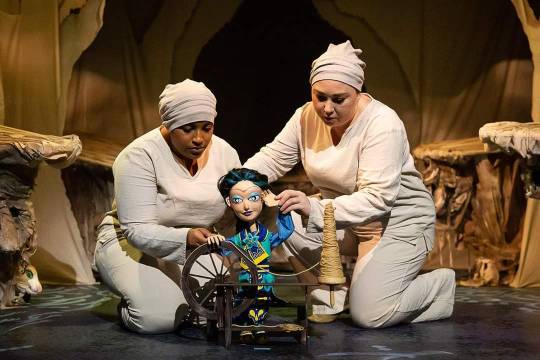#iran theater
Explore tagged Tumblr posts
Text

Tehran's most luxious cinema was designed by architect Heydar Ghiai-Chamlou. Bombed in 1973 by the Mujahedin al-Khalq Organization, it did stand tall and survived the bombing, but closed in 1979 nevertheless. Postcard by Tahrir Iran Co., Teheran. via brutgrup
21 notes
·
View notes
Text

A quadruple PM1910 MG mount on a GAZ-AA truck, Tabriz, Iran. August 1941
9 notes
·
View notes
Text






Last Summer, I worked as a puppet designer for The Moonlit Princess (Mah Pishooni), a Persian folktale directed by Afsaneh Aayani. The show was held at Rec Room in Houston and was funded by the Houston Arts Alliance.
To express the amount of time & effort that goes into a production like this is...insurmountable. As someone who is primarily used to working alone, I surprisingly enjoy being part of a crew and the collaborative efforts that help turn an idea into reality. It's an experience that I don't take for granted.
Also, it was my official debut as a puppet designer--that's pretty darn neat!
Here's to more opportunities to weave something beautiful with a group of passionate people & a unique vision. ♥
(Photography by Lynn Lane)
37 notes
·
View notes
Text
youtube
Live performance
0 notes
Text
A Wholesome Musical.
Musical play “Coraline” to go on stage in Tehran.
Warning: There are allegations that 5 women have come forward stating sexual assault/rape at the hands of Neil Gaiman. I make the post only as cultural while pending how will the police investigation go.

Iran has featured for many times in the International news, but it's wrong how they put it. Such as the cultural aspect they don't give any attention to. So it's a surprise that an Iranian musical adaptation of the English author Neil Gaiman’s 2002 novella “Coraline” will go on stage in a Tehran theater next month.
Let's get into the details:)
Omidreza Sepehri is the director of the play, which will be taken to the stage after a year and a half of rehearsal, Mehr reported.
"Coraline" is a dark fantasy horror novella that follows a young girl named Coraline Jones who moves into a new home with her parents. Their new residence is an old house divided into flats, inhabited by quirky neighbors, including two retired actresses, Miss Spink and Miss Forcible, and an eccentric man known as Mr. Bobo.
Coraline's life becomes mundane and frustrating as she struggles to gain her parents' attention, who are often distracted by their work. One day, during a rainy afternoon, she discovers a locked door in her living room, which is bricked up. Despite warnings from Mr. Bobo's mice about the dangers behind the door, and Miss Spink’s ominous predictions after reading her tea leaves, Coraline's curiosity compels her to unlock it when she is alone at home. To her surprise, she finds a passage that leads to a parallel world, eerily similar to her own.
In this "Other World," Coraline meets her Other Mother and Other Father, who are perfect versions of her real parents, offering excessive attention and affection. However, their exaggerated features, particularly button eyes, unsettle Coraline. This new reality initially seems enticing; her Other Parents pamper her, toys come to life, and the world is colorful and vibrant. However, the allure quickly fades when the Other Mother reveals her true intentions: she wants Coraline to stay forever and have buttons sewn into her eyes. Horrified, Coraline escapes back to her own world, only to discover that her real parents have vanished.
With the help of a mysterious talking black cat, Coraline learns that her parents are trapped in the Other World, and it is her mission to rescue them. The cat guides her back to confront the Other Mother, allowing Coraline to challenge her in a game. The stakes are high: if Coraline wins, she can free herself, her parents, and the souls of three ghost children trapped by the Other Mother. If she loses, she must give in to the Other Mother's demand.
During the game, she faces various obstacles and uses clever tactics, as well as a lucky adder stone given to her by Miss Spink, to locate the lost souls of the ghost children. They warn her that even if she wins, the Other Mother may still try to keep them imprisoned. Ultimately, Coraline deduces that her parents are trapped in a snow globe on the Other Mother's mantelpiece. By tricking the Other Mother, she manages to reclaim the snow globe and escapes back to her own world, slamming the door behind her and severing the Other Mother’s hand in the process.
Back in her own world, Coraline finds her parents safe, albeit with no memory of their captivity. However, that night she dreams of the ghost children, who alert her that the Other Mother’s severed hand is still trying to regain the key that connects both worlds. To prevent further danger, Coraline leads the hand to a well in the woods and casts it down, ensuring her safety and reaffirming her courage.
"Coraline" wraps up with her returning to her ordinary life, now fully appreciating and loving her real home and parents, having faced and overcome the darkness of the Other World. The novella explores themes of bravery, the complexities of family dynamics, and the idea that one should value reality, even with its imperfections, over alluring fantasies.
In 2009, director Henry Selick released a critically acclaimed stop-motion film adaptation of "Coraline," which saw moderate box office success. The film received a nomination for Best Animated Feature at the 82nd Academy Awards but lost to Pixar's "Up." While the adaptation features notable changes—such as the Beldam transforming the Other Father into a pumpkin—it largely adheres to the book's original plot.
The story has also inspired various theatrical adaptations. A musical, featuring music and lyrics by Stephin Merritt with a book by David Greenspan, premiered off-Broadway in 2009. A new musical adaptation is also set to premiere at the Leeds Playhouse in 2025.
Source: https://www.tehrantimes.com/news/507518/Musical-play-Coraline-to-go-on-stage-in-Tehran
#Neil Gaiman#Neil Gaiman Coraline#dark fantasy horror#Novella Coraline#director Omidreza Sepehri#Iran Tehran#popular culture#Iran Tehran Times#musical play#director Henry Selick#animation production#Tehran Theater#pixar animation studios#ایران
1 note
·
View note
Text




I identify as anti war
#free palestine#theocracy#iran#gaza genocide#no war#anti war#political memes#garth nader memes#dankest memes#mst memes#mystery sovcit theater memes#mistaken con man#pathetic3#tumblr memes
0 notes
Text
If the Nuremberg Laws were Applied…
-Noam Chomsky
Delivered around 1990
If the Nuremberg laws were applied, then every post-war American president would have been hanged. By violation of the Nuremberg laws I mean the same kind of crimes for which people were hanged in Nuremberg. And Nuremberg means Nuremberg and Tokyo. So first of all you’ve got to think back as to what people were hanged for at Nuremberg and Tokyo. And once you think back, the question doesn’t even require a moment’s waste of time. For example, one general at the Tokyo trials, which were the worst, General Yamashita, was hanged on the grounds that troops in the Philippines, which were technically under his command (though it was so late in the war that he had no contact with them — it was the very end of the war and there were some troops running around the Philippines who he had no contact with), had carried out atrocities, so he was hanged. Well, try that one out and you’ve already wiped out everybody.
But getting closer to the sort of core of the Nuremberg-Tokyo tribunals, in Truman’s case at the Tokyo tribunal, there was one authentic, independent Asian justice, an Indian, who was also the one person in the court who had any background in international law [Radhabinod Pal], and he dissented from the whole judgment, dissented from the whole thing. He wrote a very interesting and important dissent, seven hundred pages — you can find it in the Harvard Law Library, that’s where I found it, maybe somewhere else, and it’s interesting reading. He goes through the trial record and shows, I think pretty convincingly, it was pretty farcical. He ends up by saying something like this: if there is any crime in the Pacific theater that compares with the crimes of the Nazis, for which they’re being hanged at Nuremberg, it was the dropping of the two atom bombs. And he says nothing of that sort can be attributed to the present accused. Well, that’s a plausible argument, I think, if you look at the background. Truman proceeded to organize a major counter-insurgency campaign in Greece which killed off about one hundred and sixty thousand people, sixty thousand refugees, another sixty thousand or so people tortured, political system dismantled, right-wing regime. American corporations came in and took it over. I think that’s a crime under Nuremberg.
Well, what about Eisenhower? You could argue over whether his overthrow of the government of Guatemala was a crime. There was a CIA-backed army, which went in under U.S. threats and bombing and so on to undermine that capitalist democracy. I think that’s a crime. The invasion of Lebanon in 1958, I don’t know, you could argue. A lot of people were killed. The overthrow of the government of Iran is another one — through a CIA-backed coup. But Guatemala suffices for Eisenhower and there’s plenty more.
Kennedy is easy. The invasion of Cuba was outright aggression. Eisenhower planned it, incidentally, so he was involved in a conspiracy to invade another country, which we can add to his score. After the invasion of Cuba, Kennedy launched a huge terrorist campaign against Cuba, which was very serious. No joke. Bombardment of industrial installations with killing of plenty of people, bombing hotels, sinking fishing boats, sabotage. Later, under Nixon, it even went as far as poisoning livestock and so on. Big affair. And then came Vietnam; he invaded Vietnam. He invaded South Vietnam in 1962. He sent the U.S. Air Force to start bombing. Okay. We took care of Kennedy.
Johnson is trivial. The Indochina war alone, forget the invasion of the Dominican Republic, was a major war crime.
Nixon the same. Nixon invaded Cambodia. The Nixon-Kissinger bombing of Cambodia in the early ’70’s was not all that different from the Khmer Rouge atrocities, in scale somewhat less, but not much less. Same was true in Laos. I could go on case after case with them, that’s easy.
Ford was only there for a very short time so he didn’t have time for a lot of crimes, but he managed one major one. He supported the Indonesian invasion of East Timor, which was near genocidal. I mean, it makes Saddam Hussein’s invasion of Kuwait look like a tea party. That was supported decisively by the United States, both the diplmatic and the necessary military support came primarily from the United States. This was picked up under Carter.
Carter was the least violent of American presidents but he did things which I think would certainly fall under Nuremberg provisions. As the Indonesian atrocities increased to a level of really near-genocide, the U.S. aid under Carter increased. It reached a peak in 1978 as the atrocities peaked. So we took care of Carter, even forgetting other things.
Reagan. It’s not a question. I mean, the stuff in Central America alone suffices. Support for the Israeli invasion of Lebanon also makes Saddam Hussein look pretty mild in terms of casualties and destruction. That suffices.
Bush. Well, need we talk on? In fact, in the Reagan period there’s even an International Court of Justice decision on what they call the “unlawful use of force” for which Reagan and Bush were condemned. I mean, you could argue about some of these people, but I think you could make a pretty strong case if you look at the Nuremberg decisions, Nuremberg and Tokyo, and you ask what people were condemned for. I think American presidents are well within the range.
Also, bear in mind, people ought to be pretty critical about the Nuremberg principles. I don’t mean to suggest they’re some kind of model of probity or anything. For one thing, they were ex post facto. These were determined to be crimes by the victors after they had won. Now, that already raises questions. In the case of the American presidents, they weren’t ex post facto. Furthermore, you have to ask yourself what was called a “war crime”? How did they decide what was a war crime at Nuremberg and Tokyo? And the answer is pretty simple. and not very pleasant. There was a criterion. Kind of like an operational criterion. If the enemy had done it and couldn’t show that we had done it, then it was a war crime. So like bombing of urban concentrations was not considered a war crime because we had done more of it than the Germans and the Japanese. So that wasn’t a war crime. You want to turn Tokyo into rubble? So much rubble you can’t even drop an atom bomb there because nobody will see anything if you do, which is the real reason they didn’t bomb Tokyo. That’s not a war crime because we did it. Bombing Dresden is not a war crime. We did it. German Admiral Gernetz — when he was brought to trial (he was a submarine commander or something) for sinking merchant vessels or whatever he did — he called as a defense witness American Admiral Nimitz who testified that the U.S. had done pretty much the same thing, so he was off, he didn’t get tried. And in fact if you run through the whole record, it turns out a war crime is any war crime that you can condemn them for but they can’t condemn us for. Well, you know, that raises some questions.
I should say, actually, that this, interestingly, is said pretty openly by the people involved and it’s regarded as a moral position. The chief prosecutor at Nuremberg was Telford Taylor. You know, a decent man. He wrote a book called Nuremberg and Vietnam. And in it he tries to consider whether there are crimes in Vietnam that fall under the Nuremberg principles. Predictably, he says not. But it’s interesting to see how he spells out the Nuremberg principles.
They’re just the way I said. In fact, I’m taking it from him, but he doesn’t regard that as a criticism. He says, well, that’s the way we did it, and should have done it that way. There’s an article on this in The Yale Law Journal [“Review Symposium: War Crimes, the Rule of Force in International Affairs,” The Yale Law Journal, Vol. 80, #7, June 1971] which is reprinted in a book [Chapter 3 of Chomsky’s For Reasons of State (Pantheon, 1973)] if you’re interested.
I think one ought to raise many questions about the Nuremberg tribunal, and especially the Tokyo tribunal. The Tokyo tribunal was in many ways farcical. The people condemned at Tokyo had done things for which plenty of people on the other side could be condemned. Furthermore, just as in the case of Saddam Hussein, many of their worst atrocities the U.S. didn’t care about. Like some of the worst atrocities of the Japanese were in the late ’30s, but the U.S. didn’t especially care about that. What the U.S. cared about was that Japan was moving to close off the China market. That was no good. But not the slaughter of a couple of hundred thousand people or whatever they did in Nanking. That’s not a big deal.
450 notes
·
View notes
Text
Rejected Cabinet Nominees
Some historical guidance
TIMOTHY SNYDER
JAN 16
Historically, nominees for cabinet positions have been rejected by the Senate or have withdrawn their candidacies in order to prevent that outcome. It is not common, but nor is it abnormal. The power of "advice and consent" granted to the Senate by the Constitution has been exercised in practice.
A number of Trump's appointments are simply outrageous by historical, ethical, strategic, or any other standards. The ongoing confirmation hearings tend to normalize the bizarre (although Democrats and a couple of Republicans have asked meaningful questions.)
So a few examples of failed nominations might serve as one tool among others to keep the events of the moment in perspective.
Secretary of Defense
John Tower was the first George H.W. Bush nominee for secretary of defense. He has served in the Senate for more than twenty years, and had chaired its Armed Services Committee. He was an author of the Tower Commission report on the Iran-Contra Affair. He was questioned by Senators about his past alcohol use and womanizing.
Pete Hegseth, unlike Tower, has zero knowledge, experience, or qualifications for the of running the Department of Defense. His program, judging from his books, is to ignore foreign enemies, politicize the armed forces, and carry out a "Holy War" against Americans. Pete Hegseth's womanizing and alcohol use, by his own account, far exceed Tower's. Unlike Tower, Hegseth paid off a woman who filed a police report accusing him of sexual assault in circumstances that, by her account, strongly suggest the use of a rape drug. Hegseth had to resign from both of the advocacy groups he ran because of incompetence and drunkenness. He regularly had to be physically carried away from events because he was too drunk to stand. In once case he had to be prevented from joining strippers on a stage. He also displayed total financial and budgetary incompetence. In this connection it is worth mentioning that the Department of Defense has the largest budget of any government in history.
There is a disturbing tendency to forgive Hegseth everything because he is a veteran. This seems unfair to veterans who do not display his failures of character. But it also contains within itself the troubling idea that soldiers can do no wrong: an idea that Hegseth himself seems to hold. That way lies military dictatorship. In any event: Tower served in the Pacific Theater during the Second World War and was in the reserve for decades.
The Senate rejected Tower.

Director of National Intelligence.
This position was created relatively recently and elevated to cabinet rank still more recently. It is meant to oversee the work of all American intelligence agencies. So a relevant historical comparison will be to the position of director of central intelligence.
Anthony Lake was second-term Bill Clinton's nominee for the position of director of central intelligence. Lake was eminently qualified. He is one of the most accomplished American diplomats of the post-1945 period. Among many other positions he was Director of Policy Planning in the State Department under Carter, and National Security Advisor during Clinton's first term. His nomination ran into trouble because of two occasions when his deputies on the National Security Council failed to inform him of discussions with the chairman of the Democratic National Committee about donor access to the White House.
Tulsi Gabbard has no qualifications to be Director of National Intelligence. A very long list of Americans with national security experience regard her as a danger to the safety of Americans. She is known abroad as a supporter of two of the world's most violent dictators, Bashar al-Assad and Vladimir Putin. As a congresswomen she consistently made excuses for Assad, whose regime killed something like half a million people before it was overthrown. She proposed that the Russo-Ukrainian war could be ended "in the spirit of aloha" and repeats Russian propaganda tropes. Russian media refer to Gabbard as "comrade" and "girlfriend" and "our agent."
Under Senate pressure, Lake withdrew his candidacy.
Attorney General
Zoe Baird was nominated by Bill Clinton for attorney general at the beginning of his first term in 1993. She was eminently qualified professionally for the job. She had however hired undocumented immigrants in her household and had not paid Social Security taxes for them.
Pam Bondi is Donald Trump's nominee for the same position. As part of Donald Trump's legal team, she sought to justify his attempt to overturn the results of an election. As Florida attorney general, she accepted luxurious perks from relevant parties in cases she was considering. In that capacity she also failed to pursue a case against Trump University after a political group supporting received a check, an illegal donation, from Trump's foundation signed by Trump. As a lobbyist she represented a Russian money manager convicted in Kuwait and served as a public relations representative for the government of Qatar. She was paid more than $100,000 a month just for that assignment, which she left in order to defend Trump from conviction after his first impeachment. Then she went back to working for Qatar.
Under Senate pressure, Baird withdrew her candidacy.
Succeeding events created the closest thing we have to a historical standard for rejecting cabinet nominees by Republican Senators: the employment of undocumented workers.
After Baird withdrew, Clinton nominated Kimba Wood. She too was eminently qualified to serve as attorney general. It emerged that she too had hired an undocumented worker as a nanny. Wood did so at a time when this was legal, and she paid the appropriate taxes. Nevertheless, the mere fact that she had employed one undocumented person, entirely legally, stopped her candidacy. in 2001, President George W. Bush nominated Linda Chavez to be secretary of labor. She then withdrew her candidacy after it emerged that she had paid an undocumented person to work in her household.
So one might move beyond the obvious point that Bondi's scandals dwarf Baird's (and Hegseth's those of Tower, and Gabbard's those of Lake) and propose a pragmatic line of questioning that would apply to Trump's other nominees. Have they or their companies employed undocumented workers? It seems a reasonable question to ask, especially of the billionaires. Given the coming administration's oft-declared hard line on illegal immigration, this would seem to be a minimum standard for its cabinet nominees.
The Senate has a constitutional role, and in the past has exercised it. Some of the nominees presented to them this month are wildly inappropriate to the point of risking the integrity of American national security and calling into question basic principles of the rule of law. The history of failed nominations reminds us just how far some of these people fall below any reasonable standard.
36 notes
·
View notes
Text
The EU is being turned in a machine for war, a continent spanning army that is set to march on a whim in the name of the bourgeoisie profit. The target is, of course, Russia, China, and Iran. The US strategically tries to bring back manufacturing and establish fascism by removing all resistance in the nation,as to be able to later join the military block without internal problems. This obviously cannot be shown directly, so the little theater of separation between the US and the EU is created, as to ensure that the EU is forced to federalize and re arm while the US can embrace faux isolationism as it turns more and more fascistic. We can expect a new war in the Eurasian continent anywhere from 10 to 15 years from now (as the decrepit military production of Europe tries to recover). We must not be caught unprepared for that but rather prepare our network of resistance and ensure that the capitalist order looses the next war
#socialism#italian#communism#marxism leninism#marxist leninist#marxist#marxism#socialist#socialismo#eurasian#european union#american imperialism#china#usa
25 notes
·
View notes
Text
Why Syria Matters to the Kremlin
Syria is important to Moscow because intervening there in 2015 allowed Putin to reverse the narrative of Russian decline that had taken hold since the collapse of the Soviet Union. Russia would no longer be what then-President Barack Obama dismissed as a declining “regional power”—it was to be a decisive great-power patron of the Assad regime, and as such, it would rewrite the playbook of outside intervention in the Middle East. American-led interventions, such as the invasion of Iraq and the NATO campaign in Libya, shattered states and bred chaos. Russia would have the opposite effect, preserving Syrian sovereignty and regional order. To understand Russia’s military position in Syria, consider that when Moscow first intervened there, in September 2015, it did so with a surprisingly light footprint and a long-term plan to modernize and strengthen the Syrian military. Moscow deployed just 2,500 to 4,500 personnel to Syria at any given time, focusing on air power, air defenses, and special forces, while relying on Iran and its proxies to supply ground forces. Ultimately, the Kremlin sought to build the Syrian Arab Army (SAA) into a professional fighting force capable of independently securing Assad’s rule, and so it poured resources into modernizing the SAA’s command structures, improving battlefield coordination, and equipping units with advanced Russian weaponry. [...] The collapse of regime defenses revealed that Russia’s long-term strategy to professionalize Assad’s military had failed. These setbacks will not drive Russia out of Syria, however. The Kremlin has too much at stake. It has already leveraged its Syrian intervention to rebuild its Middle Eastern influence, positioning itself as an essential mediator among Iran, Turkey, the Gulf states, the United States, and Israel. Moscow has also secured lucrative economic contracts for the reconstruction of Syria. Given the stakes, Moscow will be compelled to adapt rather than withdraw. It will likely seek to strengthen military cooperation with Iran, including by finding a role for Iraqi militias and recruits in Syria. As consuming as the war in Ukraine has been for Russia, the Kremlin does not see it as superseding its Middle East ambitions. That’s because Syria is not just a military outpost. It is a cornerstone of Russia’s claim to great-power status, a theater where it can demonstrate its diplomatic reach and its counternarrative to Western interventionism. This explains why Russia continues to invest in Syria even as it fights a costly war in Ukraine. Moscow may adjust its tactics, but abandoning Syria would mean surrendering something far more precious than territory: Russia’s hard-won position as an indispensable power broker in the Middle East.
3 December 2024
35 notes
·
View notes
Text

Soviet BA-10 armored car near Qazvin in northern Iran during Operation Countenance, August-September 1941.
28 notes
·
View notes
Text


The cow design in The Moonlit Princess was based on a sketch I made years ago. Before I even met Afsaneh (the director) or became involved with puppetry.
Once I read the script, I immediately dug out the image. There's some incredible coincidence between the colored stripe pattern on the head & traditional Gilaki (northern Iranian province) clothing... which we incorporated into the character.
That moment felt serendipitous, like it was written in the stars. *:・゚☆
18 notes
·
View notes
Text
It's so frustrating how wrecklessly and maliciously the Israeli regime can act militarily, and yet, the Western media will never properly contextualize their acts of incitement. I don't like Iran anymore than I like Israel, but I can't really blame them for responding to the intentional provocation of another government. All the handwringing about it is theater. In the mainstream, it is perfectly acceptable to opine about "Well, what did Hamas, Hezbollah, Iran, etc. expect?" This is a fair question, but you can not ask the same of Israel. Israel is taking escalatory actions. Everyone knows it but pretends to be shocked when there are escalatory consequences. If this explodes into WW3, it will objectively be the fault of Israel and its enablers, and yet, Western talking heads will say it was inevitable.
45 notes
·
View notes
Text
لشکر طعنه / به افتخار مرگ
youtube
1 note
·
View note
Text
by Benjamin Kerstein
The U.S. decision to finally end Iran’s perennial impunity and force its theocratic regime to pay a price for its genocidal imperialism is welcome, but it means we are about to meet a familiar personage once again: the weeping terrorist.
The weeping terrorist is a bifurcated creature. First, there is the terrorist part: He slaughters large numbers of people in the most sadistic and public way imaginable; wipes out entire religious, ethnic and racial groups of which he disapproves; undermines and topples governments; foments civil war; props up dictators and tyrants; and finally commits genocide.
Then comes the weeping part: When the victims retaliate, the terrorist erupts into floods of tears at his unprecedented and unspeakable suffering, the brutal assault on his rights and freedoms, the vile racism and bigotry of those who persecute him, the immutable purity of his motives and the righteousness of his cause.
The weeping terrorist has been here before, particularly in his Palestinian nationalist form.
For over a century, the Palestinian national movement has murdered, raped, dismembered, incinerated, assaulted, slandered, demonized, ethnically cleansed and religiously persecuted not only Jews and Israelis but anyone who stood in its way. For just as long, the Palestinians have responded to any retaliation with a deluge of tears. No one has suffered as much as they, they sputter, no one’s “resistance” has ever been more justified, and no people has faced such racist and genocidal enemies. After all, look at all these dead women and children, the weeping terrorist wails after having murdered scores of women and children.
This piece of theater has been performed by many empires, nations and religions. But it must be said that it is embedded particularly deep in the history of Islam. To this day, Muslims view Muhammad as a persecuted prophet without honor in his own country, when he was an immensely powerful and notably aggressive warlord. One may feel he was justified in being so, but the fact that he was is incontrovertible.
The Muslim world today often brands its enemies as “crusaders,” although the Crusades were essentially a belated response to the Muslim conquest of the entirety of the Middle East and North Africa, the subjugation of their indigenous populations, and the establishment of a settler-colonial empire. Indeed, Muslims still lament the loss of Andalusia, even though they had merely lost what they had conquered and colonized from Christians a few centuries before.
89 notes
·
View notes
Text
U.S. President-elect Donald Trump’s looming return to office is causing sleepless nights in Europe. Diplomats expect Trump 2.0 will cause more headaches because the world is less stable today than it was in 2017.
Chief among their fears is the growing partnership between Russia, China, Iran, and North Korea. “Trump is getting one global theater. And everything our adversaries are doing right now seems connected,” a Western security official said, on the condition of anonymity.
It’s unclear if Trump—not shy about his domestic agenda coming first—understands exactly what the prospect of an alliance between four nuclear powers whose leaders hate the United States means.
“These are four countries who are already working together against American interests,” said Brett Bruen, former White House global engagement director. “North Korea is helping Russia invade Ukraine. Iran’s proxies are attacking ships in the Red Sea. China is buying Iranian oil. It all fits and could get worse if Trump becomes more isolationist.”
North Korean dictator Kim Jong Un’s decision to aid Russia by sending troops to Ukraine is the most surprising and ostentatious example of how the axis of autocracies might continue to grow.
The benefits to the Kremlin are obvious: Russia has suffered heavy losses since the start of the war, and North Korea is willing to help plug that gap by sending its own men to near-certain death.
What’s in it for Pyongyang is less clear. “There is significant risk of North Korean soldiers defecting as soon as they arrive in Ukraine—something the South Koreans are preparing for,” said John Everard, the former U.K. ambassador to North Korea. “Defections from his elite special forces would embarrass Kim. It would also be a major embarrassment if his troops turn out to be useless. It could damage his reputation as a man to be truly feared.”
However, Everard also said that Kim needs a backup plan. “North Korea has been almost solely reliant on China for a long time, and China has been signaling its displeasure at Kim’s new relationship with Russia,” Everard said. “Meanwhile, we don’t know what Kim is getting in return for sending troops to Russia. Perhaps he wants help developing new nuclear weapons and missile technology, or perhaps he has been forced to agree to send troops because, now that his stockpiles are exhausted, he can no longer meet Russian demands for munitions.”
NATO officials fear a global escalation of the European conflict. If North Korea continues to support Russia, does South Korea support Ukraine by sending missiles? Might Ukraine strike North Korean targets? And if it did, would North Korea demand China makes good on treaty commitments to protect North Korea? While alliance sources say that is “close to China’s worst nightmare,” it’s being seriously considered.
Anything that eases Russia’s burden in Ukraine gives Russian President Vladimir Putin room for his long-term objective: weakening the West and expanding Russian influence. Europe will continue as his primary target.
“The Kremlin and its proxies have attempted to influence multiple elections in Europe with the specific aim of installing pro-Russian politicians or governments across the continent,” said Keir Giles, a senior consulting fellow in the Russia and Eurasia program at Chatham House.
Whether it’s claims that the United States sees Europe as a colony via NATO or that Ukrainian neo-Nazis are offering human sacrifices to pagan gods, there are thousands of examples of Kremlin proxies seeking to coerce Europeans into hating Putin’s enemies. This type of activity often peaks during elections and has helped Kremlin stooges, such as Irakli Kobakhidze in Georgia, win elections or grow in strength across Europe.
Obviously, anti-West and anti-NATO sentiment is a danger in Europe itself, but it also has consequences for Americans. “The United States benefits when Europe’s economy thrives. It benefits from a strong Europe standing up for U.S. interests further afield, especially in Asia. There is no benefit to the United States if Europe becomes a Putin playground,” Giles said.
For Iran, the new axis of autocracies provides answers to some existential questions. Bluntly, Iran needs allies, and its relations with the other three are largely transactional.
“Iran plays different roles for each of these actors: To Russia, it’s a military partner and potential thorn in the side of the United States. To China, Iran is key to energy security and specifically the security of oil shipments from the Gulf,” said Mohammad Ali Shabani, editor of Amwaj.media, a website that publishes analysis on the Middle East.
Iran, a country with multiple regional enemies—chiefly Israel—might seek increased military support later. This could be of concern to the United States if the region becomes less stable in the coming years. “The main threat that Iran could potentially pose for the United States is in the region, with American military bases and other facilities potentially at risk in the event of an all-out confrontation,” Ali Shabani said.
All the potential chaos the other three can cause would suit China well, especially if Trump whacks Beijing with steep tariffs once in office.
One European diplomat explained that a common fear among their peers is that Trump doesn’t fully grasp how many moving parts there are nor how they interact with each other. There is legitimate concern, for example, that Trump will cut a deal on Ukraine and pull back from NATO. Doing so would expose European security and leave the continent vulnerable to Russia. Trump also wants to impose tariffs on European exporters.
“You cannot withdraw support for Europe’s security, hit their economies, then expect their companies to stop selling semiconductors to China or consumers to not buy cheaper Chinese goods, which means what happens in Europe now could have consequences for Taiwan, which would have consequences for allies in the Indo-Pacific. It’s all connected,” the diplomat said.
Fears that Trump doesn’t take global affairs seriously are hardly new. But what might be different in his second term is how much, or how little, attention he pays to the rest of the world.
“The first time around, people were worried he would be looking for reasons to hit the red button,” Bruen said. “I think this time, it’s more concerning that he will turn a blind eye to the rest of the world and see the behavior of people like Putin and [Chinese President Xi Jinping] as not being America’s problem.”
Trump might want to focus on a purely domestic agenda, as is his right. But enemies are looking at a potential void right now and seeing an opportunity to reach a shared objective: to take a major bite out of Washington’s global influence and swallow it up themselves.
32 notes
·
View notes